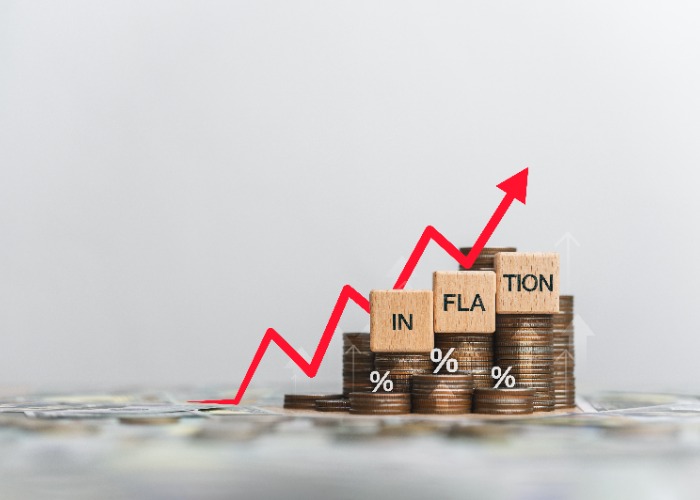Inflation to rise in 2025: steps to take now

Costs look set to keep rising across the board, but there are steps you can take to minimise the impact of inflation on your finances.
Inflation is making an unwelcome return in 2025, heaping more pressure on household budgets.
Latest inflation figures show the CPI measure of inflation jumped sharply from 2.5% to 3% in January, driven by rising food prices, airfares and private school fees.
Worryingly, this is unlikely to be a one-off increase, with the Bank of England forecasting inflation could hit 3.7% later this year.
While that's nowhere near as bad as the double-digit price rises seen in recent years, it's still concerning for millions of cash-strapped households – especially those on fixed incomes.
Thankfully, there are steps you can take to minimise the impact of inflation on your finances.
Before we get into that, let's look at some of the factors that will likely drive up prices in 2025.
Bills, taxes and salaries all rising rapidly
As mentioned earlier, food prices are already rising sharply, with food price inflation jumping from 1.9% to 3.1% in January.
Analysts at stockbroker Peel Hunt forecast in January that food inflation in the UK could approach 4% by the end of the year as supermarkets navigate cost increases following Labour’s Autumn Budget, which increased the National Living Wage and National Insurance payments for employers.
Energy prices are also expected to rise twice this year – in April and July.
The Energy Price Cap, set by regulator Ofgem, previously rose by 1% on 1 January, increasing a typical household’s usage paying by direct debit to £1,738.
Analysts are currently forecasting an increase in the Price Cap of between 5 to 7% in April, with an additional hike in July.
This means average bills could rise by a figure between £90 and £120 in April, with an extra £30 to £70 increase in July.
Energy consulting group Cornwall Insights expects the energy price hike in April to come in at 5%.
The Price Cap previously rose £149 back in October 2024 and £21 in January, meaning the Energy Price Cap could be more than £350 higher this Summer than last year.
Throw in the fact that salaries are rising at 6% according to the latest pay figures, and the potential inflationary impact of US trade tariffs and it's clear inflation is only headed in one direction.
“Inflation is now 1% away from (the official) target and heading in the wrong direction, and consumers better buckle up for prices to trend higher throughout this year," said Laith Khalaf, head of investment at AJ Bell.
"The Bank of England reckons inflation will hit 3.7% in the third quarter, and that’s without a potential tariff shock stemming from US trade policy.
"The chancellor’s decision to raise National Insurance and the National Living Wage from April will no doubt feed into the inflationary dynamic.
"A survey conducted by the CIPD found that 42% of affected employers intended to raise prices to offset higher costs."
Given that prices are only headed in one direction, what should you do to shield your finances?
5 ways to protect yourself against inflation
There are a few steps you can take to achieve this.
1. Sign up to a fixed energy tariff while you can to shield yourself from future price hikes. Want to save even more? Here’s how to save further on energy costs.
2. If you have savings, put your cash in a savings account paying an interest rate that is above inflation – so ideally around 4% and over. Here's our guide to the best savings account rates.
3. If you have money that you don’t need short term, look to invest it to beat inflation. Remember to make the most of your ISA allowance too.
Ready to invest but want to shield your returns from the taxman? Open a Stocks & Shares ISA with Hargreaves Lansdown now.
4. Cut your grocery costs by shopping at discount stores, switching to cheaper brands, making use of loyalty card points and keeping to a budget. Here’s our guide on how to save at the supermarket.
5. If you get a pay rise, try to keep within your existing household budget instead of being tempted to spend more. Check out our guide on how to save thousands of pounds off your bills.
Comments
Be the first to comment
Do you want to comment on this article? You need to be signed in for this feature